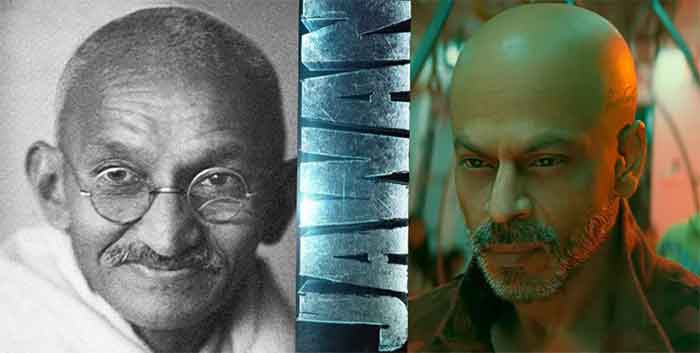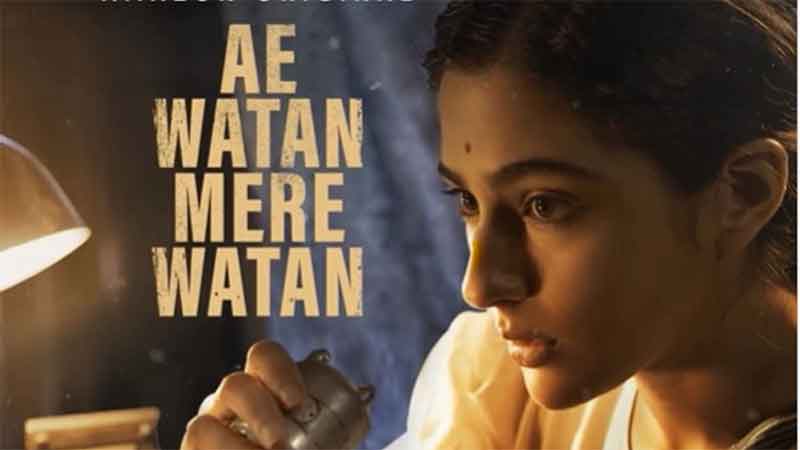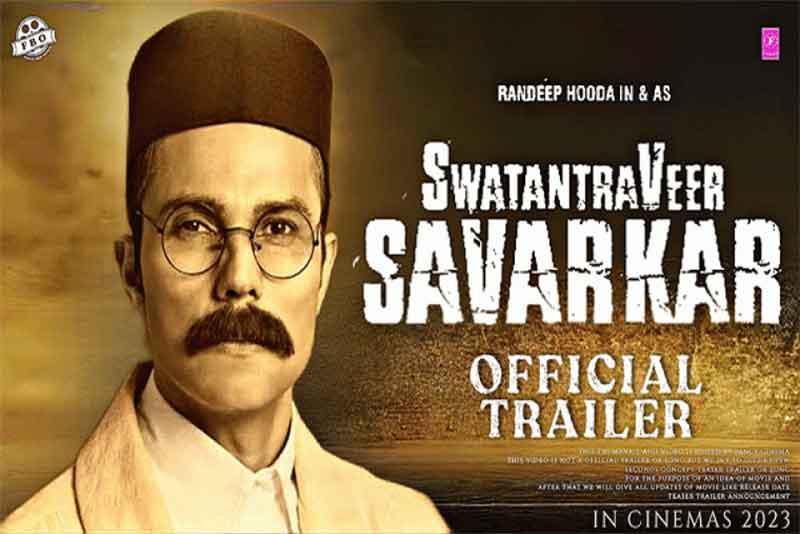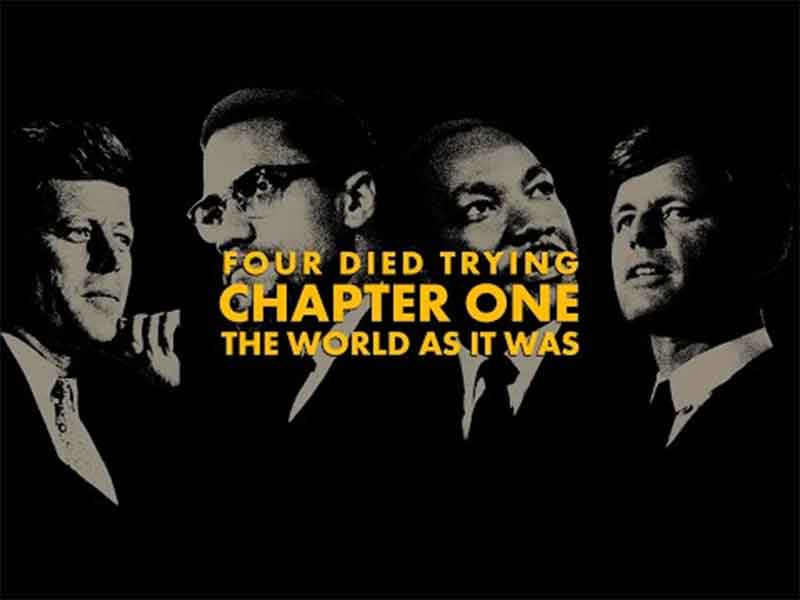
Cast of Jawan
Shah Rukh Khan: Hindi-speaking North Indian Rajput army-man Vikram Rathore and his son, the ‘casteless’ policeman Azad
Nayanthara: Hindi-speaking upper caste (Bhumihar, Brahmin or probably Rajput given the arrange marriage scenario between Azad and her), head of special forces, Narmada Rai
Vijay Sethupathi: Corrupt industrialist Kalee Gaikwad, Maratha by name but generic South Indian by accent, played by a Tamil actor
Deepika Padukone: Vikram Rathore’s wife, Aishwarya, who is in all likelihood of the same caste as Vikram Rathore, given how easily they romance publicly in a village setting
Plot of Jawan
Shah Rukh ‘Azad-Rathore’ Khan kills Muslim terrorists (an assortment of Kashmiris, Afghans, Pakistanis one assumes), Chinese invaders and corrupt Dravidian industrialists—supported by a Bane-like Russian oligarch—for the advancement of the country.
***
Before we begin, a few questions to set the tone.
Who has killed and is killing more people in the seven northeastern states of the Indian Union: The Indian army or the Chinese army?
All of us, even the most insulated, know stories of Indian security forces raping and killing people in the northeast, but do any of us know such stories about the Chinese security forces in that region?
Why would the filmmakers choose to show something non-existent over something that is much too existent? Why lie about the invaders being Chinese?
Why not just show the truth that the invaders in those villages are Indian security forces?
***
The lie. That’s what we are interested in here. On the one hand, we have always been told by all known and unknown authorities—parents, assorted elders, teachers, bosses, gods—that we should not lie; on the other hand, we know for a fact that all of them lie for a variety of purposes, on a pretty regular basis. The lie occupies this dual space, always disavowed but always practiced. It is not that I do not know lying is wrong and I do it. I know lying is wrong but I will do it anyway.
And there’s a good reason for that too. All of us also know, at least in practice, that the policy of total honesty towards fellow beings or a pursuit of truth at all costs would make life hellish. We choose life over morality. We routinely lie to our loved ones to protect them from pain. We lie to authorities like bosses and the police because we deem them unworthy of the truth. We lie to our enemies to cause them harm.
But we have made certain considerations for morality. For example, we almost universally judge a cheating spouse. We condemn those who defraud the vulnerable. We hold public figures accountable for lying. And so on.
In practice, we seem to make a distinction between lies that are okay and lies that aren’t. The onus is on the liar to justify the lie. An argument has to be made, a justification constructed about why lying was better than saying the truth. We ask the liar why we should accept the lie instead of rejecting it for the truth? And the liar responds with his reasons. And then we investigate those reasons for their validity.
Just such an investigation is being carried out on Jawan. In addition to the lie mentioned above, which was a lie of representation, the film tells some more:
1) It only takes a good jailer to convert an Indian prison into a happy reformative place.
Jails aren’t bad because jailers are bad. How can jails be good in a system in which all public institutions are rotten? One good jailer cannot be a corrective to a systemic rot.
2) People can vote corrupt industrialists out of power in union elections.
Given how much money is needed to win elections, where else is the money going to come from? When has a party not financed and supported by corrupt industrialists ever won a union election in India?
3) Russian money interferes in and influences the outcome of elections in India.
We are well aware of the role played by corporations like Meta in our elections. When did you last hear of Russian interference?
4) There are Muslims in the army and the intelligence who will be entrusted with special ops and high positions
Okay, okay, this is another lie of representation. The army and intelligence officers shown could definitely have been Muslims. Its just that the chances of that happening are so low that it makes almost no sense to make them so. There are barely any Muslims in India’s intelligence agencies, says this article; and the representation of Muslims in the army officer corps is at around 2 per cent, according to this article.
5) The environment can be saved by shutting down some factories
As if there are only a few factories which are flouting environmental regulations. The rape of the environment is a systemic issue that won’t stop even if all the factories follow all the current regulations
6) Azadi in India is possible, there exists some sort of ‘good’ nationalism which can improve the state of the country, thus making people free of poverty, injustice and corruption.
Now we ask of Jawan. Why this lying? Why should we accept these lies?
Jawan as a noble lie for the greater good
Jawan is being feted as a mass entertainer with a socially relevant message. One commentator—in an article aptly titled Shah Rukh Khan’s Jawan is not what we deserve, but the film we need right now (but more on this superhero reference later)—credits Jawan with bringing social commentary back to mainstream Bollywood cinema.
What is this social commentary?
One, Jawan highlights the issue of farmer suicide. It makes sure we understand that farmers are being crushed under the burden of debt not because the government and the banks don’t have money (they seem to be able to bail out industrialists alright) but because they don’t want to use that money to help farmers.
Two, Jawan shows the sorry state of public hospitals in India and is at pains to make sure that we understand, again, that the reason public hospitals are like this is not because the government is unable to improve them but because the government lacks the will to improve them.
In an addendum to the hospital issue, it also manages to throw in the case of Dr Kafeel Khan, who was imprisoned on charges of medical negligence, corruption and dereliction of duty after sixty-three children died at Gorakhpur’s BRD Medical College in August 2017 due to shortage of oxygen, which he blamed on the administration and ‘systemic failure’.
Three, Jawan tells us that companies flout environmental norms openly because of the failure of the government to enforce them.
Four, Jawan points to the trenchant corruption in Indian politics and all but says that elections are bought and paid for by industrialists who then go on to control the governments they create.
Five, Jawan tells us, maybe inadvertently, that India was as corrupt in 1986 as it is more than thirty years later. Given that only the Congress had meaningfully ruled until then, this would imply that both the BJP and the Congress are responsible for the sorry state of affairs in the country and things didn’t start magically deteriorating after the BJP ascended the democratic throne in 2014 (or as Kangana would have it, after India became independent in 2014). This is more than most liberal commentators are willing to admit these days.
All these issues that Jawan raises are true enough and needed to be raised. To be able to say that we need change and reform in the country and that the situation is really bad, the film had to lie about certain things (one has to pass the censor board after all). Are the messages not worth the lies? The makers decided that they are.
What they indulged in then were noble lies. Lies told for the greater good. Coming back to Batman, Jawan is the necessary lie that Shah Rukh Khan chooses to tell for the greater good of India. For the people of India need just such lies at this time.
“Religious intolerance and not being secular … is the worst kind of crime that you can do as a patriot,” Shah Rukh Khan said in 2015. If religious intolerance is the worst kind of crime and BJP is the representative of this kind of crime, then it would make sense to get the BJP out of power by hook or by crook.
If it takes lies to get the BJP out of power, then so be it. If to stop the worst crime possible, we need to commit smaller crimes, so be it.
If one needs to tweet congratulating Modi for his G20 presidency so that one can release Jawan without any issues, then so be it.
Or as Krishna might have said, the war against the BJP must be won and if a lie ought to be told to win it, then it must be told.
Jawan as an offer of pragmatic compromise
Like Vijay Sethupathi asks Shah Rukh Khan in the film, the film asks us, the audience—Deal?
What is this deal Shah Rukh Khan wants to make with us?
The deal is this—If you want BJP and its hard Hindutva out of power, accept Hinduism and the unity and integrity of India. If you want to be rid of Modi’s Hindutva, accept Tharoor’s Hinduism.
Accept that freedom is possible within India. Accept that Hindus can be lived with on an equal footing. Accept to be a patriotic, nationalistic Indian.
Forget your anti-caste struggle against Hinduism. Forget your freedom struggle against India’s occupation of Kashmir. Forget Khalistan. Forget Naxalbari. Forget the rape of the northeastern states. Forget the pauperization and criminalization of Muslims. Stop focusing on the chokehold that big capital has on the Indian state. Stop worrying about the degradation of the environment that is making this land all but unliveable.
Only focus on living peacefully with the Hindus. Do whatever it takes to make that a reality.
Forget identity politics. Do not vote for caste, religion, community, etc. Vote as an individual. Think as an individual. Act as an individual. And have an individual connection with the country, independent of any other-identity markers.
Instead of voting for fear, money, caste, religion, community, ask questions to those who came to ask for your vote. Ask them what they will do for you in the next five years. If someone in your family falls ill, what will they do for their treatment? How will they help you find employment? What will they do to advance the country?
Out of all the things they could find fault with BJP about, they choose corruption as the biggest evil. This is because corruption is the least ideologically fraught evil and is directly aimed at improving and strengthening the state (The opposition to the BJP is being hijacked by the anti-corruption discourse just like the opposition to the Congress had been before 2014). And the way they choose to tackle corruption is by voting correctly.
The deal, then, is also this—If you want to get rid of BJP, you cannot dissent as a Muslim or a Dalit or a Naxal but only as an unmarked (casteless, religionless, regionless) patriotic citizen against corruption.
Deal or no deal?
In the film, Shah Rukh Khan refuses to accept the deal Vijay Sethupathi offers. Should we reject the deal the film offers to us? No, we should not, the film argues, for we cannot bear the consequences of rejection.
Shah Rukh Khan is able to reject the deal because he is a superhero (he is almost literally immortal, ain’t no mortal surviving falling down from a plane), and superheroes are not to be emulated by regular-ass people.
Regular people change the system by the hard work of educating, organizing and agitating. One has to educate people for them to recognize the source of their oppression. Then one has to organize them into a collective. And lastly, one has to get that collective out on the streets with enough motivation to face what the oppressors decide to throw at them.
Superheroes, on the other hand, are individuals who can single-handedly change the system (or at best with the help of a motley crew). They as if contain the effort and power of a whole organized movement within themselves. They are a one-man revolution.
What kind of a superhero is Shah Rukh Khan playing? What is his superpower (aside from inhuman strength and immortality)? He can single handedly bring an emotional transformation within people, so that the system can be changed without any violence. He can bring about a revolution without revolutionary violence by bringing about a change of heart in the masses.
You guessed it right. Shah Rukh Khan’s superhero is modelled after none other than our favourite father, MK Gandhi. They both say that it is possible to change people’s hearts without upending the system of oppression and domination. According to the film, freedom is possible within India. Just as, for Gandhi, it was possible for Hindus to behave humanely without annihilation of caste.
The prison where Azad is the warden is Gandhi’s ashram and the girls there are his mothers, sisters, daughters, etc. Just like those girls who served Gandhi, the girls in the prison serve Azad. This is why the prison is such a utopian place—It is not a prison at all but an ashram. Sevagram. Azad is the saint of Sabarmati. Where the women even engage in social service by producing prosthetics for handicapped children, weaving clothes, etc.
Can we possibly emulate Gandhi? Of course not. It was already obvious even within his lifetime that Gandhi was not to be emulated but only appreciated from afar.
For us, Gandhi occupies the dual role of the lie very effectively. While constantly paying lip-service to Gandhi, all of us have always gone about life’s business keeping practicalities in mind. While eulogizing Gandhi into a saint, Nehru and Patel went around threatening and beating erstwhile princely states into the Indian Union. The Indian state still makes much of Gandhi’s non-violence while being one of the most violent states in the world today. Our politicians model themselves after Gandhi while lying through their teeth. We, ourselves, keep elevating Gandhi to an ideal while wallowing in consumerism. And so on.
At this point, some smart-aleck might make the observation that Shah Rukh Khan could not have modelled his superhero character after Gandhi because Azad/Rathore uses a lot of violence and kills multiple people. Well, my dear reader, Gandhi’s favourite book in the whole wide world was the Bhagavad Gita, which expressly says that violence is alright in a dharmayuddha (righteous war), especially when undertaken by the Kshatriya. It is not a coincidence that Shah Rukh Khan has chosen to become a Rathore in Jawan. It is not a coincidence that Shah Rukh Khan agreed to go bald to look more like Gandhi. Finally, Vijay Setupathy’s casting as Ravan is no coincidence either.
Now for a film which tells us to reject the deal
Mari Selvaraj’s Maamannan also released in 2023. Starring the Minister of Youth Welfare and Sports Development of Tamil Nadu, Udaynidhi Stalin—who is not a silent rebel like Shah Rukh Khan and recently asserted in a public function that Sanatan Dharma should be eradicated—the film is also quite directly aimed at the upcoming elections.
That film also chooses an enemy—An upper caste man (played by Fahadh Faasil) who is proud not only of his caste but also of the caste system itself. All he wants from life is to walk around arrogantly and pass on everything he has earned to his child. He believes his caste is his identity but he also cynically pays lip service to social justice to advance his political ends.
The film’s solution to the problem of caste is voting correctly, just like Jawan. But Maamannan does not ask people to vote as unmarked individuals to advance the country. The film educates people about caste oppression, asks them to organize as an anti-caste community and agitate for the annihilation of caste. The film argues that one of the ways to fight caste oppression is to vote Dalits into positions of power. Vote to advance the cause of Dalits, not to advance some abstract notion of the country.
In this film too, a deal is offered. Do not dissent as a Dalit and we will let you share power. In this film too, the deal is rejected. But this time, the deal is not rejected by a superhero. It is rejected by an everyday vulnerable man who gets his power from others, from being part of a community. As an individual, Maamannan (played by Vedivalu) is nothing. But as part of a community, he is a formidable force.
This man is supposed to be emulated. This film does ask us to reject the deal. It tells us that we can all be part of such communities. He is afraid but he perseveres. So can we.
What are you going to choose?
At the end of the day, Jawan only offers us false choices. To accept Hinduism in order to vote BJP’s Hindutva out of power would be to lose the plot. Hinduism and Hindutva are just different versions of Brahmanism, it really does not matter which stays in power.
The false choice offered by Jawan is part and parcel of the other false choices being offered to us: BJP vs Congress; India vs Bharat.
For the vast majority of Indians, there is no difference between the Congress and the BJP. Operation Green Hunt and Salwa Judum were Congress inventions. Congress is as much an upper-caste Hindu party with a horrifying record on caste violence as the BJP. Congress has betrayed, killed and raped more Kashmiris in particular and Muslims in general than the BJP; and the same is true for the northeast.
As for Bharat and India, it really doesn’t matter what you call the country as long as it remains one country. You could call it ‘naatu naatu’ and it would still be the violent colonial juggernaut that it currently is. Dalits would still be raped by all and sundry, Muslims would still be ‘encountered’ by policemen and burnt by Hindu vigilantes, Kashmiris would still be massacred by the army, Sikhs would still be villainized by the media, and so on.
Against all these false choices, Maamannan offers two responses:
1) The total rejection of both Bharat (represented by BJP) and India (represented by Congress) for a third front of solidarity of all those oppressed by the Brahminical Indian state
2) Tactical alignment with Hinduism (the Congress) to defeat its more rabid form Hindutva (the BJP), but with this always in mind that Brahminism (both the Congress and BJP versions of it) is the ultimate enemy
It is up to us to decide what we want to do.
Akshat Jain is a writer currently residing in India. He uses the debate methodology of Syādvāda to piss people off. Like a good Syādvādist, he claims that all his claims fall within the ambit of falsifiability.















































